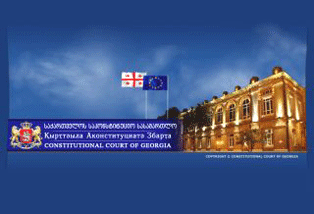The Constitutional Court of Georgia Found Several Norms in the Law on Manifestations Non-Constitutional

Kakheti News Center
The Constitutional Court of Georgia found several norms in the Law of Georgia on Assemblage and Manifestations non-constitutional. As a result, those norms were abolished which prohibited assembly and manifestations within 20 meters radius of several institutions and administrative buildings, among them court building entrances.
The Constitutional Court of Georgia announced its judgment on the case Movement for the United Georgia, Conservative Party, Zviad Dzidziguri, Kakha Kukava, Dachi Tsaguria, Jaba Jishkariani, Georgian Young Lawyers Association and Public Defender of Georgia VS Parliament of Georgia today.
The press-center of the Constitutional Court reported that “due to the particular importance of the case and high possibility of its influence on the early established practices by the Constitutional Court, the case was discussed by the Plenum of the Constitutional Court.”
The issue of the suit was: compliance of the norms of the Law of Georgia on Assemblage and Manifestations, of the Administrative Code of Georgia and Law of Georgia on Investigative Department of the Ministry of Finances with the Article 19, 24 and 25 of the Constitution of Georgia which guarantee freedom of speech, expression and exchange of information, as well as right to assembly and manifestation.
The Constitutional Court of Georgia partly satisfied the constitutional suit. The Court found those norms unconstitutional which banned assembly and manifestations within the radius of 20 meters of several institutions and administrative buildings, as well as from the court building entrances. The Court agreed with the allegation of the suitors that similar prohibition contradicts the Constitution because in certain cases it makes assembly and manifestation impossible. In addition, the Court pointed out that the right to assembly can be restricted if it hinders proper functioning of the institution or if prohibition is caused by particular security measures.
The Court found the norm of the law unconstitutional which allowed a citizen to initiate an assembly or manifestation but deprived similar right from the person who does not hold citizenship of Georgia.
The Court found those norms constitutional which prohibited blockage of the public thoroughfare for personal purposes (among them with various constructions, subjects and cars). The Court considered that blockage of the street possible only when it is caused by high number of demonstrators. Restriction of the organized car-movement in residential areas was considered constitutional if it blocks or occupies the entire public thoroughfare.
In parallel to it, the Court declined the norm which requested to immediately stop gathering if the street is blocked or some other requirements of the law are breached by protesters. The Court clarified that protest participants shall have chance to make their manifestation compliant with the law requirements. The assembly shall be ceased only when legal request of the authoritative official is resisted or disobeyed.
The Constitutional Court concluded that the norm of the law, which prohibits slogans for the forceful overthrow of the current government during assembly and manifestation, complies with the Constitution. The court decision states that disputable norm shall be viewed together with the Law on Freedom of Speech and Expression which allows restriction of expression only if demonstrators call for violent actions and when the danger is real. In addition, the assembly can be ceased if slogans for forced overthrow of the constitutional government have mass character.
The Court concluded that prohibition of paintings and slogans near the administrative buildings is constitutional. The Court concluded that inscriptions on the facades of the administrative buildings and nearby can breach public order and security.
The Constitutional Court concluded that those norms, which prohibit assembly and manifestations near the residential house of the judge, is constitutional because it ensures independence of the judge (court) and guarantees protection of the personal life of the judge.
Due to specific character of goals, competence and authority of the investigative department of the Ministry of Finances, the Constitutional Court concluded it was correct to prohibit the employees of the institution to participate (to organize) in the assembly and manifestations.



